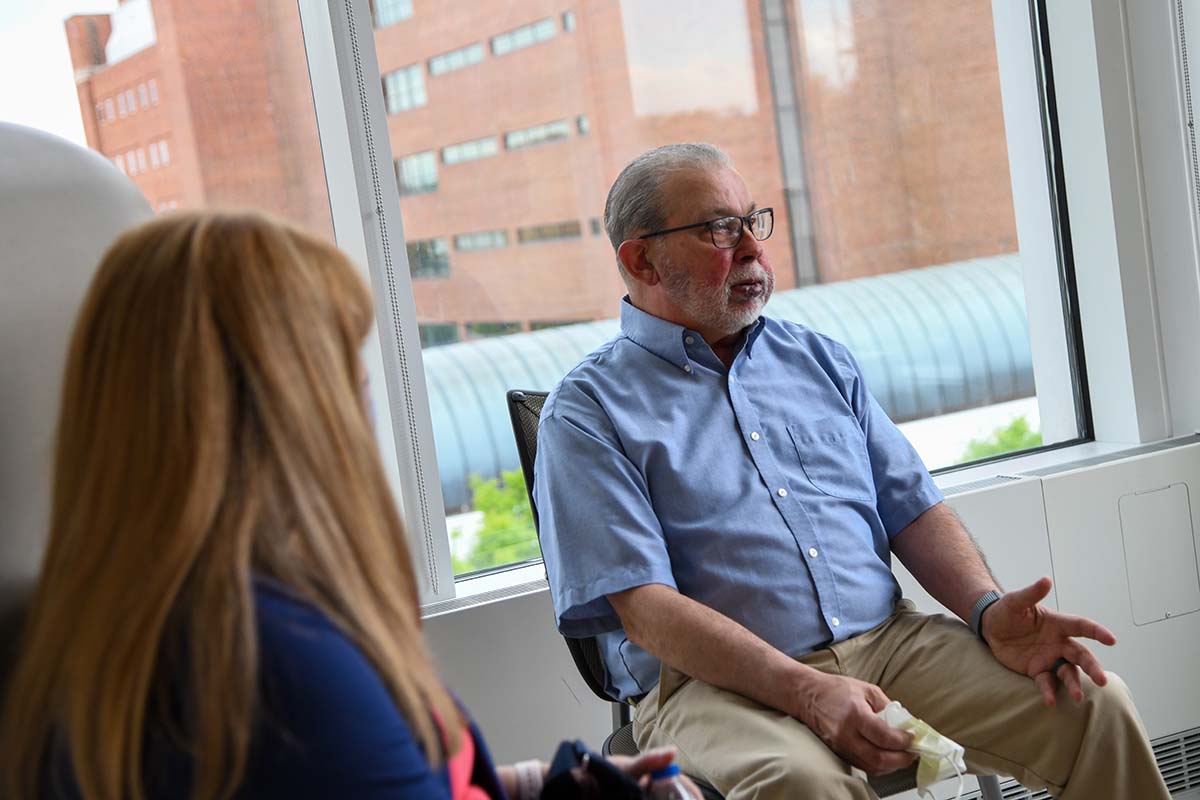
It’s easy to understand why David Lunt was shocked to learn he had stage 4 lung cancer. Yes, he’d smoked in the past. But he hadn’t touched a cigarette since 1995 — nearly 30 years ago. He was doing 15- and 25-mile bicycle rides; his lungs seemed in great shape.
David found out about this lung cancer last year after it spread to his brain. At UVA Health, he found a treatment that’s helped him return to his normal life. It’s not a cure, but it’s giving him more time.
David’s story shows that avoiding lung cancer isn’t as simple as just quitting smoking or never starting. People smoke and struggle to quit for dozens of reasons. In this Q&A, he offers his best advice on how to quite smoking.
How did you start smoking?
I grew up in a household where both parents smoked cigarettes and both maternal grandparents were smokers. I can only recall a very few adults in my childhood and teen years who weren’t smokers.
I never thought about the idea of choosing to smoke or not to smoke. I began smoking one afternoon with a pair of childhood friends who stopped by my house and invited me along to join them smoking some cigarettes one of them had acquired. That was about 1970. I was about 14 at the time.
As I grew a bit older and entered high school, smoking developed into a social activity. Nearly all my friends were smokers. Initially, my smoking was sporadic and occasional, but as I got older my habit continued to develop. By the time I entered the U.S. Coast Guard in 1975, I was regularly smoking a pack of cigarettes a day.
How did smoking turn into a bigger habit for you?
In my Coast Guard workplaces smoking had been generally not allowed in the shipboard engineering spaces, classrooms, or most offices. The only time I could smoke freely at work was during a break.
Taking a break, going outside, and lighting up a cigarette with workmates became a ritual and served like a trigger. It was hard to break that connection, yet it overcoming it was a very important contributor to my success in quitting.
An additional trigger I had to overcome was smoking while driving. I had to rethink my habit of throwing live cigarettes out the window to dispose of them. I had to change my attitude about that from a behavior of “this is how it is done” to one where I could see it as “rude, inconsiderate, and dangerous.” It bothers me to this day when I see the vast quantity of discarded butts on the side of the roads where I ride my bike.
What made you want to quit smoking?
Over the course of my years as a smoker, I had attempted to quit several times. There were different prompts at different times. Economics was one.
Current or Former Smoker?
A screening can save your life by catching lung cancer before you have symptoms. Recent changes to screening guidelines mean more people qualify than ever before.
In Nashville, Tenn., in 1979, I was out with some friends and ran out of cigarettes. I went up to a vending machine to get some and they were $1 a package. I walked away from the machine vowing to never pay a $1 for a pack of cigarettes. That was a short event, until I returned home a few weeks later and picked up smoking again.
Later that year, I married my wife, Valerie. She had never been a smoker. I stopped smoking for her sake. At that time, I quit for nearly a year. That quitting attempt was reinforced by the work I was doing at the time, which made it difficult to be a smoker as we could not carry matches or lighters in many circumstances.
At one point I tried to substitute smokeless tobacco. I quickly discovered it was nasty tasting and upset my stomach! I resumed smoking the next year when I was reassigned to a training center as an instructor. While I did not have a lot of time during the day to smoke, after work I would gather socially at the club with co-workers who smoked. In a short time I was “bumming” cigarettes from them; then I started buying my own.
Every time I started smoking again, it seemed like I would smoke more.
When did you quit smoking permanently?
I successfully stopped smoking in June 1995, the day I departed from my assignment as Chief Engineer Officer, US Coast Guard Cutter RELIANCE. My next assignment was as a full-time mechanical/manufacturing technology student at New Hampshire Technical Institute in a Coast Guard-funded 2-year academic program.
I quit smoking because it was one habit that I did not want to take with me to school from my time as a sailor. Times had changed with regards to acceptance and encouragement of smoking. I was sure smoking would be an inconvenience and a big distraction in school.
I thought being a full-time student was going to be hard enough. The day I left RELIANCE, I threw away about a half a pack of cigarettes and just stopped.
How did you make quitting finally stick?
I had the willpower focused on my desire to achieve at school, and I had shared my intent to stop with my family, my coworkers, and people within my church faith community. They prayed for me as well as I prayed to God that He would break my addiction. I still regularly pray for respite from the triggers and temptations that would lead me back to an active smoking habit.
From your experience, why is quitting so hard?
It is quite difficult to break any addiction. Smoking seems to me to be a very complex combination of addictions. I think to succeed each of them needs to be dealt with to overcome in some focused way.
There is a physical dependency component of the nicotine causing things to happen in your body. This creates a craving you want to satisfy with smoking.
There are physical rituals associated with the act of preparing the cigarette, lighting it up, inhaling, exhaling clouds of smoke. If you watch smokers, they will go often through a little routine each time they have a cigarette. Breaking that routine can be a real challenge.
There is usually a social component of sharing the smoking and associated behavior with other people. Sometimes sitting to have a cigarette is associated with accomplishing a task. Sort of a feeling of accomplishment or a job well done.
What’s your advice for people who smoke or are struggling to quit smoking?
Look carefully at your triggers. Ask yourself:
- When do you smoke a cigarette, and why you do you chose to smoke it?
- What does it accomplish for you?
- How does it make you feel?
- What is good about it?
- What is not so good about it?
- Have you been advised to stop by a healthcare professional?
- If you find there are a lot of not-so-good things about it, could you choose to do something else?
The strongest thing I had to break was the social triggers. I was blessed at the time to have a significant job assignment change. That removed a number of triggers.
I think you have to go into it knowing that it will be challenging, knowing that you might not be able to do it the first time. You are not the first one to have the habit or the first one to struggle to try to quit. It can be done!
How important is support from others?
It may be difficult to secretly quit. I was not able to do it alone. You need to find a way to get support. Express your goal to your family, your spiritual and social community, your healthcare professional, and in your workplace. Be prepared to share your struggles and your successes.
Often open accountability is very important for personal accountability. In the face of an addiction you may find it easy to rationalize with yourself. But it’s more difficult to rationalize your behavior to others.

